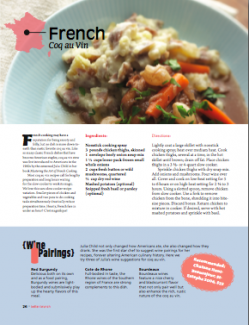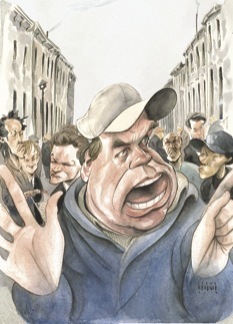Salvete, omnes! It's been too long, dear readers. With the capstone project coming to a close and the rest of my coursework, I've regretfully neglected you. Anyway, what follows is an abbreviated update:
David Simon's "Treme": Amazing. Watch it if only for the music alone. I wasn't sure if some of the holdover actors from "The Wire" would be able to make the transition, but they've become their new characters seamlessly. Check out one of my favorite scenes in which Creighton Bernette (John Goodman) gives the youtube world his thoughts on post-Katrina New Orleans.
New York: I'm officially landing there June 5th, and will start the publishing program the next day. I can't even begin to express my excitement.
The capstone: The trip to Meredith Corp. in Des Moines, IA, went fabulously. Details to come in the "Better Brunch" tab. Above is a grab of page in our "Brunch Bazaar" feature. I'm having issues uploading such a large pdf, but the entire mag should be available soon.
What I'm reading now:
Barbara Kingsolver's "The Lacuna"
"Best New American Voices," edited by Dani Shapiro
"Gravity's Rainbow," Thomas Pynchon
My website:
What do you think of the new layout of the portfolio page? Let me know!
David Simon's "Treme": Amazing. Watch it if only for the music alone. I wasn't sure if some of the holdover actors from "The Wire" would be able to make the transition, but they've become their new characters seamlessly. Check out one of my favorite scenes in which Creighton Bernette (John Goodman) gives the youtube world his thoughts on post-Katrina New Orleans.
New York: I'm officially landing there June 5th, and will start the publishing program the next day. I can't even begin to express my excitement.
The capstone: The trip to Meredith Corp. in Des Moines, IA, went fabulously. Details to come in the "Better Brunch" tab. Above is a grab of page in our "Brunch Bazaar" feature. I'm having issues uploading such a large pdf, but the entire mag should be available soon.
What I'm reading now:
Barbara Kingsolver's "The Lacuna"
"Best New American Voices," edited by Dani Shapiro
"Gravity's Rainbow," Thomas Pynchon
My website:
What do you think of the new layout of the portfolio page? Let me know!

